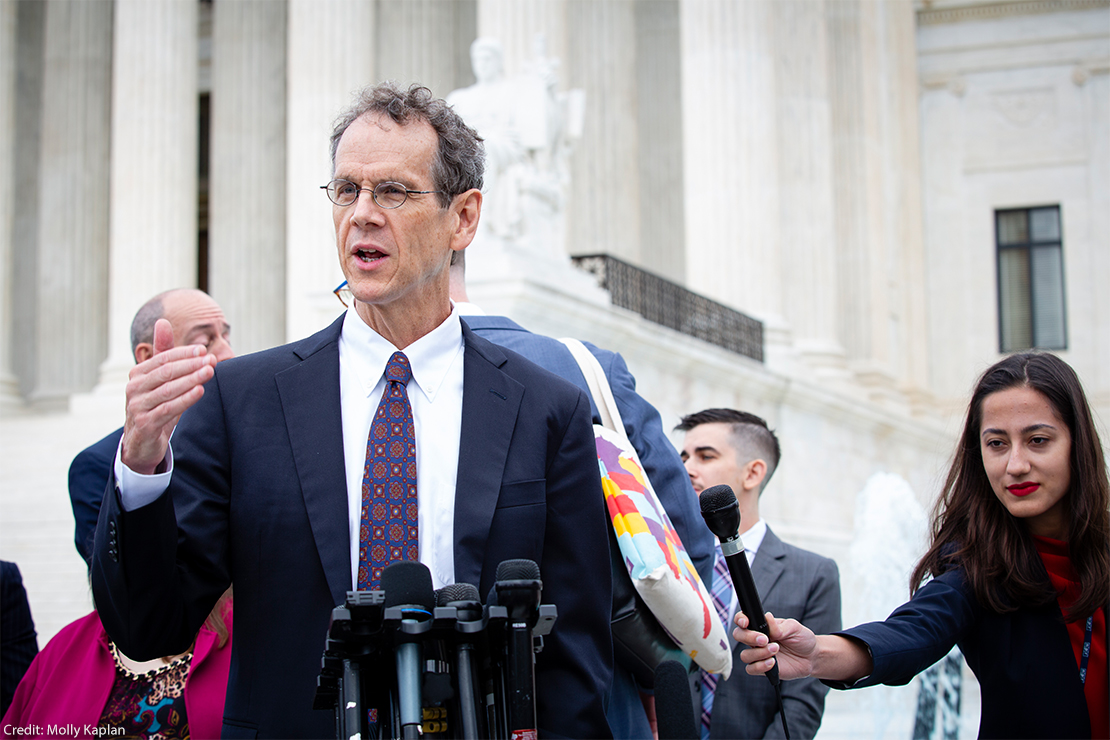This November, Freedom is on the Ballot
In less than six months, Joe Biden and Donald Trump will once again face off for the presidency. While a presidential rematch is relatively rare — this marks the first time since 1956 — the outcome of this particular rematch will have an outsized impact on our civil rights and civil liberties. Beyond any one issue being on the ballot this November — freedom is on the ballot in no uncertain terms.
While the ACLU does not endorse or oppose candidates for elected office, we know that a potential second Trump administration and a potential second Biden administration will be drastically different when it comes to our civil rights and civil liberties. A second Trump administration will be disastrous for our most fundamental rights and freedoms, while a second Biden administration will bring a mix of challenges and opportunities that largely leaves these rights and freedoms intact. At the ACLU, we’re prepared for either scenario. Our legal, policy, and advocacy experts have identified the constitutional challenges that each candidate will bring, and the concrete actions the ACLU will take in response.
Starting next week, we will share our findings in a series of 13 memos — seven memos on a potential second Trump administration and six on a potential second Biden administration — to be released through August. The memos will address a range of issues, including immigrants’ rights, abortion access, LGBTQ justice, racial equity, police reform, and more.
To move the national discourse beyond agonizing over potential challenges to analyzing potential solutions, our memo series outlines not only the threats to our freedoms, but also includes comprehensive, substantive, and actionable solutions the ACLU will use to block the punches — egregious attempts to ignore the Constitution — or lessen the blows.
I believe in the strength of our commitment because I’ve seen what our organization is capable of accomplishing when our freedom is on the line. In 2016, the ACLU was the only national organization to issue a comprehensive plan for the policies of a potential Clinton administration, but also those of a potential Trump administration. That plan laid the groundwork for us to file 434 legal actions against the Trump administration, including the first lawsuit to halt the Trump Muslim ban within hours of its enactment.
Our detailed analysis of Trump’s policies foreshadowed a constitutional crisis that, nearly a decade later, continues to impact our nation as a whole. Today, our analysis once again prepares us to continue that fight, over the course of the next administration and beyond, just like we did in 2016.
Right now, Trump maintains a lead in most polls. While much can change between now and November, we must be prepared for the possibility that Trump may return to the White House. We know that a second Trump administration will be significantly more aggressive and effective in executing its plans to fundamentally erode our democracy, take away our freedoms, and violate our Constitution.
If Trump wins, we stand ready to meet his administration head on — in the courts, in Congress, at the state and local level, on the street, and at the ballot box. Already, we’ve taken note of the extremist rhetoric he’s used on the campaign trail, including promises to:
- Erase protections for LGBTQ people across the entire federal government and mandate discrimination, including banning transgender people from serving in the armed forces.
- Pursue retrogressive immigration policies — including reinterpreting the 14th Amendment to apply only to people who are born in the United States and have at least one parent who is a U.S. citizen or lawful permanent resident — that harm communities of color.
- Restrict refugee resettlement and asylum and end deportation protections for DACA recipients and those with Temporary Protected Status.
- Appoint justices who will carry out the Trump administration’s intentions to use antiquated laws to ban abortion or limit access to contraception.
- Eliminate race-conscious instruction in schools and diversity, equity, and inclusion (DEI) training in the workplace.
- Undermine press freedoms by regularly attacking media organizations he dislikes, and invoke the Insurrection Act to intimidate opponents and shut down dissent.
- Renew efforts to make it harder for Americans to vote and to spread false, debunked theories to undermine confidence in the integrity of our voting system.
- Promote unconstitutional and brutal state policing and federal law enforcement practices, dehumanize people in our criminal legal system, and accelerate mass incarceration.
Four years after Trump was elected, our nation was reeling from relentless attacks on fundamental rights and freedoms. When President Joe Biden and Vice President Kamala Harris took office, the ACLU released a wish list that called on the Biden administration to do two things: reverse Trump-era policies, and protect and extend our freedoms as part of a vision for our country that included justice, fairness, and equality for all.
Since then, the Biden administration has made progress toward this vision by expanding voting rights and abortion protections, as well as advocating for equal access for transgender individuals and for students’ right to receive an inclusive education. We remain concerned, however, that the administration has not fulfilled its critical civil rights and civil liberties responsibilities across a range of issues, including:
- Fully banning racial and other profiling. The Biden administration has permitted profiling for national and homeland security purposes, and at the border. These contexts can be pretexts for law enforcement to target Muslims, communities of color, and immigrants.
- Ending suspicionless surveillance of Americans under Section 702 of the Foreign Intelligence Surveillance Act (FISA). The Biden administration instead pressured Congress to dramatically expand Section 702, resulting in legislation that creates new ways for the government to spy on us without a warrant.
- Restoring the Voting Rights Act of 1965 to its full strength. While restoring the Voting Rights Act requires congressional action that has been blocked, the Biden administration has yet to fully implement its executive order promoting access to voting.
- Ending the federal death penalty – a commitment Biden campaigned on in 2020 – and fully implementing the reforms promised in his executive order on policing.
The ACLU is determined to hold a future Biden administration accountable for, among other things, protecting the right to abortion and contraception, preserving our asylum system and providing a path to citizenship, safeguarding the right to vote for all Americans, and bringing necessary reforms to our criminal legal system. The ACLU’s commitment to this work remains unchanged now, and for years to come.
In less than six months, our nation will send one of these candidates back to the White House. But this election is not just about who will be president — it’s about our freedom, our future, and the trajectory of our democracy. Rest assured, however, that no matter who wins, the ACLU will be ready to use all of the tools at our disposal — litigation, legislation, advocacy, and grassroots mobilization – to ensure that our nation lives up to the promise of the Constitution.



